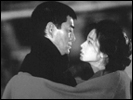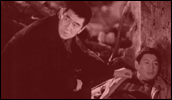Demon
- Year
- 1985
- Original title
- Yasha
- Japanese title
- 夜叉
- Director
- Cast
- Running time
- 118 minutes
- Published
- 20 March 2001



by Jasper Sharp
Retired yakuza gangster Shuji (Ken Takakura) moves back from Osaka to a remote coastal village to start a new life as a fisherman with his family, his arrival from the city coinciding with that of the beautiful bar hostess Keiko (Yuko Tanaka, who provided the voice of Lady Eboshi in Princess Mononoke). Keiko's new bar, as its name Hotaru ('firefly') suggests is soon acting as a magnet for all the local fishermen, much to the chagrin of their wives. Not soon after the arrival of Keiko's roguish lover Yajima (Kitano), also an ex-mobster, the locals are drawn into a host of collective vices including gambling and all-night drinking sessions.
After a truly stand-out scene in which Yajima runs rampage through the village on a heroin-induced spree with a carving knife, he is run out of town by Shuji, but not before slashing Shuji's shirt open during the fracas to reveal the tattoo of a woman's face upon his back. With Shuji's gangster past now revealed he finds himself ostracised by the local community and drawn towards the sympathetic character of the bar hostess with whom he shares a common past. When Yajima rears his ugly head one more time in order to borrow money from Keiko to pay off a debt to the yakuza, it is to Shuji that she turns for help, threatening to upset his domestic apple cart and pitch him back towards his old life.
An early feature acting role for Takeshi Kitano, made some four years before he made his own directorial debut with Violent Cop (Sono Otoko, Kyobo ni Tsuki, 1989), Kitano here is credited under the "Beat" persona with which he made his name alongside "Beat" Kiyoshi Kaneko in the early 80s as part of the "Two Beats" comedy (manzai) double act. The duo had by now split up and Kitano himself was already forging a successful solo career.
Kitano's role here is suitably spirited as the heroin-addicted louche who has fallen on bad times, almost upstaging that of real lynchpin of the piece, Ken Takakura. Already a major star in Japan due to a number of prominent yakuza roles in the 70s (including the Abashiri Prison series which ran from 1965-'72), Takakura also made a number of successful Hollywood appearances in Sydney Pollack's The Yakuza (1975) and later in Ridley Scott's Black Rain (1989) and the Tom Selleck comedy Mr. Baseball (1992 - Fred Schepisi). His ability to portray taciturn characters racked by internal dilemma had made him a star back home as the stoic Japanese archetype.
The 'Yasha' of the title, referring to the tattooed image on Shuji's back, is a predatory vampire from Japanese mythology incarnated in the form of a beautiful woman. This oriental succubus is here manifested physically in the form of Keiko, who here acts as the bridge between Shuji's past and present.
Yasha is very much a character-driven piece, and a lot of time is spent establishing the dynamics of the main players within the village milieu. As such the plotting may seem a little too surely paced, and consequently, given the rather anticlimactic pay-off, the film feels a little overlong. However, the snowbound fishing village where the action is predominantly set is beautifully captured by cinematographer Daisaku Kimura (who also shot Furahata's 1999 film Poppoya - Railroad Man), complemented by the slow background crash of the waves on the soundtrack in a romanticised contrast between the innocent simplicity of village life and the dangerous allure of the big city. It's a sedate film indeed, but as a whole Yasha's modest charms are hard to resist.